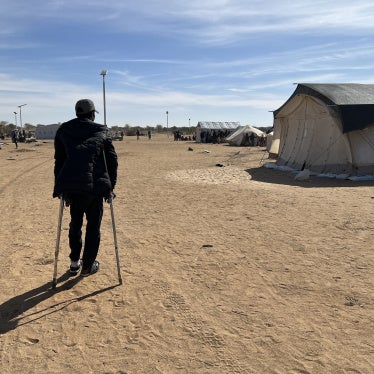It was nearly nine years ago that the United Nations Security Council took what looked like an impossible step and referred the situation in Darfur to the International Criminal Court (ICC). But since then, no one facing an arrest warrant for crimes committed in that western region of Sudan has appeared before the court.
Tomorrow, the Security Council will be briefed on Darfur by the ICC prosecutor. The question is: what should the council do to support the Darfuri people?
The court has brought charges against seven people in Darfur for crimes in violation of international law, including genocide. It has issued arrest warrants for four individuals: the Sudanese president, Omar al-Bashir, along with the minister of defense, a governor, and a militia leader. The court also issued summons to appear to three rebel leaders. One of the rebel leader cases is expected to proceed to trial next year, with the suspect voluntarily appearing at the ICC.
Arrests can be one of the most difficult challenges for an international court and Sudan brazenly refuses to cooperate with the ICC to turn over the fugitives. While the ICC’s prosecutors, first Luis Moreno Ocampo and now Fatou Bensouda, have repeatedly asked the council for help, their calls have fallen on deaf ears. The council has not even responded to formal findings sent by the court on non-cooperation by Sudan and a small number of ICC member countries that have briefly welcomed the fugitives inside their borders.
Now, the violence continues in Darfur and has spread elsewhere in Sudan. The government has deployed ground forces and allied militia to attack villages in Darfur and, since 2011, Kordofan and Blue Nile. Its air force indiscriminately bombs civilians.
Even during fighting between different tribal groups, government forces that have participated are killing civilians. Human Rights Watch found evidence that ICC fugitive militia leader Ali Kosheib was leading attacks on villages in Central Darfur in May. Another fugitive, Ahmed Haroun, was governor of Southern Kordofan in 2012 when Sudanese forces were implicated in serious abuses there.
Sudan’s failure to cooperate with the ICC is an affront to victims and risks fueling future abuses. It is also an attack on the council’s authority and credibility. The Security Council should immediately act on the court’s communications on non-cooperation and call for Sudan to surrender the fugitives to the ICC. Over the longer haul, council members need to develop a strategy to work individually and collectively to mount pressure on Sudan to cooperate with the court.
The Security Council opened the door to enable justice for international crimes committed in Darfur, but without further action the ICC won’t be able to effectively prosecute the atrocities that have been committed there.









